I’m going light on hyperlinks today because my desktop machine is — the horror, the horror — back at ClickAway. Of course they can’t reproduce the problem. Of course they won’t listen to me. Going to ClickAway is like descending into a horrible, crippled, slow-motion world. My machine has to spend the weekend there, waiting for them to observe it’s inability to start on Monday morning. If they remember. Wheenk wheenk wheenk. I’m doing this blog entry with some difficulty on my laptop. A desperate voice from the front…
I’ve obsessively collated, edited, ordered, and responded to a bunch of your comments on PS2 Note #1 through #6. To find these notes, you can put put “PS2 Note” into the Search box at the upper right hand corner of the blog.

<<<<<=====rs on One Mind: I notice that in panpsychism or hylozoism you have many separate consciousnesses, a different mind in each thing. How does this relate to the mystical or Eastern-philosophy notion of the universe being filled by one cosmic mind? When a log burns, its silp consciousness might experience a great release into the freedom of being the air, merging into the consciousness of the air which previously in sensed not so clearly. One thing that seems to be consistently reported about awakening, as in enlightenment, is the realization that “I was always awake.” It’s not the personality that wakes up, but the connection to the All. <<<<<=====Steve H on One Mind: Why would each pebble have its own separate memory? Why not have all rocks share a big memory, and all fire, etc. Fires are transient; they’d see their inevitable entropic destruction as soon as they became sentient and panic, try to spread. I feel like a fire wouldn’t have much to say except “Feed me.” But maybe they have a shared racial memory, so you can light a match and talk to it; the next match remembers your question. =========>>>>>Rudy on One Mind
In any case, I do believe in the One Cosmic Mind. Monism. But that’s a wholly separate issue from whether or not rocks can think as individuals. The name “panpsychism” for the idea of objects being alive is a little misleading, as it sounds like it might mean that there is Cosmic Mind. Monism can be true or false independently of whether or not rocks have minds.
On enlightenment, the other day Terry Bisson said to me, “I figure that your existence is a huge circle, and everything is singing, and when you’re ‘alive’ is the only time that you don’t hear the song.”
I think we could accept that a fire has a localized and rather short life. Maybe the fire accepts it too. Maybe they don’t care about dying. As I think I said before, the reason death is such a big deal to us is that we are genetically reproducing beings. We need to spread our genes while alive. An inorganic being doesn’t have that issue. There’s always more fire. The flame dances and enjoys with no fear of extinction.
This said, there’s something to the idea that the fire might pass its thoughts on to another one. Maybe fires’ souls cumulatively get smarter.

<<<<<=====alek on Living Organs: Do parts of a human body other than the brain become sentient as well? If so, then as well as your old brain, you’d have silp personalities inside you too, like etheric parasites. Maybe humans turn into something new. =========>>>>>Rudy on Living Organs
I do sometimes feel like my organs are alive. Richard Pryor had a routine about his heart choking him to repay him for all the cigarettes. But it would be really different to have the parts talk to you in voices in your head. But, you know, they already do. Sometimes you don’t listen and the pain gets worse.
In some ways, I think live in the hylozoic era won’t be all that different. I’m working all the time now to see objects around me as alive. It’s not that big a switch.
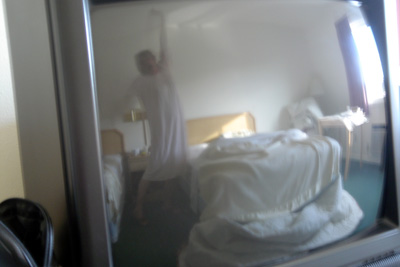
<<<<<=====rs on Ghosts: Maybe when a human dies, there is a real ghost, as the memory persists in the matter that made up the body? Could a body repair itself? =========>>>>>Rudy on Ghosts:
So you’re brain is mush, but the muscle slips and bone silps are still active. I can see some zombie scenes. This is a great idea. Zombies are cool.

<<<<<=====rs on Googling: Note that in our world, effective search in the style of Google requires massive indexing and massively distributed hierarchical computing. Does something analogous happen in the world of PS2? =========>>>>>Rudy on Googling:
That’s an interesting problem. It would be worth at least mentioning this though. About how the silps all have to work together to keep the index working. It’s like a tax they’re paying to Gaia, and Gaia is doing the indexing because it helps her think. Maybe some silps want to hold on her, but she won’t let them.
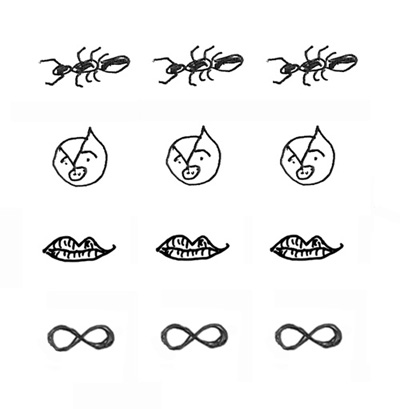
<<<<<=====Joe Ardent on Atomic Silps: Is there a threshold of size or complexity for an object to wake up? Are your body’s cells awake? The molecules that comprise them? The atoms of the molecules? The quarks of the atoms? There could be disciplines devoted to communing overtly and directly with your cells or atoms. Mindful meditation to the max! =========>>>>>Rudy on Atomic Silps:
This is a traditional objection to panpsychism, the slippery slope that ends with quarks and electrons being alive. But why be stingy? Let the l’il gaahs have their tiny little lives. Fireflies of mind. Quantum mechanically, even a single electron is a gnarly computation, a vibrating state function field.
There was this stoner bible some forty years back, Thaddeus Golas, The Lazy Man’s Guide to Enlightenment, I worshipped that book. And his big teaching was that there’s only one kind of thing in the universe. Monads kind of. “Nobody here but us chickens.” In his view, the mind of an atom was in fact just as rich and big as the mind of a human, a sun, or a rock. I can see running with this idea a little. If you push too hard, this turns into Monism. The ubiquitous and identical Many are in but multitudinous reflections of the One. I can see using this as a move at some point. But for most of the book, I want the rocks and so on to be nitty-gritty alive. And, yeah, the atoms are alive, but we don’t talk to them so much. They’re like a chorus in the background.
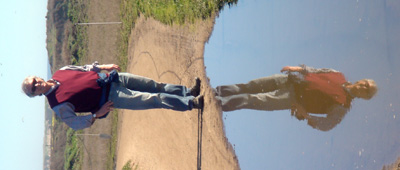
<<<<<=====Steve H on Time Scale: Silps might not be on our time scale at all. Rocks might think in geologic time, atoms in Planck time. =========>>>>>Rudy on Time Scale:
In principle a valid point. Atoms might think really fast, planets really slow. But for purposes of the story, I’m not gonna go there.

<<<<<=====Steve H on Silp Intelligence: Giving a rock the power to think might not be enough. With no instincts or desires, what would they reach for or wonder about? I’d say you need installed software along with the lazy-8 memory or you’d have a Zen rock garden that did its own meditating. You have it right when you say they’d be little gurus meditating, already in nirvana at birth. Maybe it takes a nudge to start them off thinking. Didn’t Treebeard say the elves wanted to wake everything up and talk to it? Perhaps a silp mind coalesces around fragments of legacy AI code. Would the new mind find life as a pebble tedious? I think talking silps would be rare, and silps with something to say even rarer. I suspect silps who spoke might inspire pilgrimages. =========>>>>>Rudy on Silp Intelligence:
When the lazy eight unfurls and the silps are born, they reflexively “eat” all the nants and orphids, absorbing their data. I’m not going to have the beezies per se survive, but some of that thinky code will be in the silps. It’s good legacy code, it comes to us from when Mars was a Dyson sphere of a jillion nants, the Nant Mind figured a lot of stuff out. So that gives our silps a kind of boost that they might not otherwise have. In fact other planets with unfurled lazy eight don’t have such smart silps as we do. Earth itself is worth a pilgrimage. “See the incredible talking rock!” But those talking rocks are all over the place on our weird wonderful world.
I’m just beginning to get a glimmer of how rocks think. They actually like being made into walls. They like being stuck together with mortar, and they think it’s cool to be raised up a few feet above the ground. Getting high!
<<<<<=====alek on Artistic Hylozoism: I saw a video kind of like yours on YouTube made by an autistic woman, who has her own language that she describes as ‘being in constant conversation with every aspect of my environment’. Living in a panpsychic world would really, really change the way we are. =========Ira Madclaw on artistic hylozoism: The artist Andy Goldsworthy totally lives in the hylozoic world. =========>>>>>Rudy on Artistic Hylozoism:
rs compared my videos to the autistic video too. Thanks a lot, guys! I was just really happy in my video, don’t you understand? Seriously, I get what you’re saying. That’s a great video, too, by the way, I put a link to it up there, and I found it by seaching video.google.com.
I can really relate to where that woman is at. And her argument is that by kind of dancing with the world she’s speaking a kind of language with it — in addition to the regular language that we normals speak. Sometimes I go hiking with people and we end up talking the whole time and not adequately seeing the nature.

<<<<<=====Steve H on Kiqqie Animals: Sentient dogs and cats might be very common and dangerous. As smart as we are and with less morals, they could become a new criminal class. Insects could be very dangerous - hordes of hyperlinked roaches might be a menace. =========>>>>>Rudy on Kiqqie Animals:
I haven’t thought much about animals with high IQ or at least perception increase. This is a good point, I’ll have to take it into account. But maybe not till PS3, I have enough issues already I think.
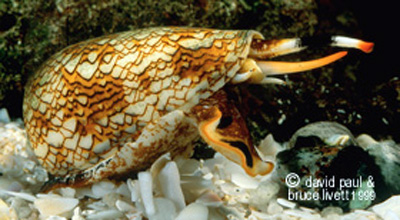
<<<<<=====Steve H on Scary Silps: I think you’ve had a key insight that some of them might be angry or cold, and not very good company. It would be a handy trick if, say, a garden gnome took over the planet or your kneecap went on strike; just erase them. Every doorway might have a silp-remover field to prevent your pocket change from screaming “don’t spend me, daddy,” or your rings and jewelry from demanding jewelry of their own. <<<<<=====Doctor Jabbir on Scary Silps: Redwoods are not intrinsically unfriendly. But remember our species clear-cut this entire valley about 100 years ago and trees have very long memories. I am wary of redwoods and give them my excess nitrogen whenever i can. =========>>>>>Rudy on Scary Silps:
I don’t think there’s any way to “stun” the mind out of a silp. Their mind is stored in the eighth dimension, and we can’t really touch that. I do see some limitations on the silps imposed by Gaia. It would just ruin things if objects could teleport, so I’m gonna decree that Gaia doesn’t let them.
I like the idea of cranky silps. That’s what animist religions are all about. Getting in good with the spirit that you annoyed by defiling a certain glade. In animism we have meta silps too, like a panther god that lives in all panthers, which was something Steve H was talking about. But I don’t want to go there. Gotta limit the options. As it is, I’m in more danger than ever in writing the Mathematician Godfather novel: “He makes you an offer you can’t understand.”

<<<<<=====Steve H on Telepathic Parasitism: In terms of being parasitized or used as a slave on a server farm, someone could come up with a bit of brain software to prevent someone leeching off your calculating ability by distorting the data as it was processed. Or maybe your brainware could give them viruses. If leeches couldn’t trust the data they cribbed, they’d give up. If we could block parasitic usage of our computation, then we could sell off computer time. Or band together for members-only brain sharing. =========>>>>>Rudy on Telepathic Parasitism:
I’ve already decided that in day to day life humans simply have the ability to close off our telepathy. Like you can close your eyes or put in ear plugs. We gotta have that or we’re screwed. Maybe rocks aren’t that skilled, maybe they can’t close themselves off, because they don’t need to anyway, as rocks aren’t mind gaming each other much.
The evil Kang are in fact going to parasitize our uncommonly rich silps and use them as a server farm. And they’ll be waiting like slobbering ghouls at the door to parasitize us every time we open our telepathy blinders. So it’s either be parasitized or don’t do telepathy.
The Rull and the Magic Harp will in fact help humanity figure out a way to stave off the Kang parasitism. I’m calling the firewall (obscure math joke) an Ultrafilter. I suppose it could work by warping the input/output enough to make it useless or by spreading viruses. But I’m thinking I’ll come up with some other means of its action.
As for the group mind-sharing, that’s a separate idea, and a good one. Thinking clubs. Well, that’s what this blog is an example of right now, isn’t it?

<<<<<=====Joe Ardent on Telepathic Society: How is individuality preserved? Because of course, the gnarliest behaviors come from just that right mix of boundaries and merging. People are really anthologies as it is: our separate cognitive modules have really high-bandwidth interconnections inside our brains; a group of people is really just a single cognitive entity whose higher-level cognitive modules (whole brains) communicate via low-bandwidth channels (language and other expressive mechanisms). There’s probably an inverse relationship between level of cognitive ability and maximum speed of data transfer between peer-level modules, and that relationship has evolved over millennia for maximum gnarliness (and hence adaptability). The lazy eight telepathy seems like a way around that: a high-quality, high-speed channel between two or more really giant, sophisticated cognitive machines (brains). But maybe society works worse with high-bandwidth communication. A lot of effort might go into techniques for maintaining and defining inter-brain boundaries, much like the discipline of cultivating Zen non-attachment in the face of the overwhelming material richness the world provides. Increasing the data flow could easily degrade the gnarliness of the computation space, like a flash flood overwhelming a whirlpool in a stream. =========>>>>>Rudy on Telepathic Society:
This is a rich vein of thought. I’ve played a lot with dynamical systems and parallel systems like alife colonies or cellular automata. And indeed, these things can be very finely tuned for gnarl, and if you change essential parameters you spiral down into dead repetition or up into chaotic dog-barf seething. So maybe society doesn’t “work” when communication gets to be so high-bandwidth. Certainly it would change in ways hard to imagine—thus the need for the PS2 thought experiment.

<<<<<=====Joe Ardent on Merging: It might be hard to restore the flame of an individual mind after too deep a merge. =========>>>>>Rudy on Merging:
Yeah, I’m all over this idea, I talked about it in my novel Saucer Wisdom already. I also think of the spacecases who took acid too many times. Too much merge. Can’t snap back. But with lazy eight we’ll be more robust. A complete system backup awaits in the eighth dimension.
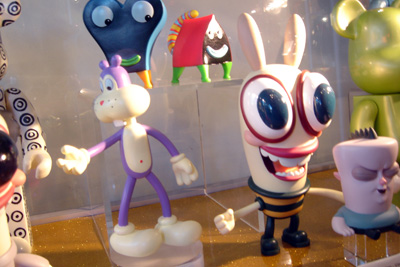
<<<<<=====Doctor Jabbir on Quantum Mechanics: The most intriguing property of the quantum world is the notion of complementarity—that you can ask one question (momentum?) or another (position?) but not both and that somehow the world contains both but you can’t get at it. There is also the possibility of asking questions that were simply inconceivable in a classical. Maybe if we could find some classically nonsensical ways to address the macroscopic world we’d produce entirely novel and unexpected outcomes. I suspect that consciousness is one of these answers that the world gives to a weird-ass request and that there are more ways of being out/in there too that can be discovered by learning to ask to right questions. =========>>>>>Rudy on Quantum Mechanics:
I love this line of thought. Maybe consciousness consists of a weird-ass request. “Am I happy?” I always come back to Damasio’s idea that being consciousness means having a mental image of yourself watching your life. So your conscious mind is the thing watching the feelings of your self-image as it watches your life. That’s how rocks get conscious too, by the way. They become aware of themselves having feelings about things.
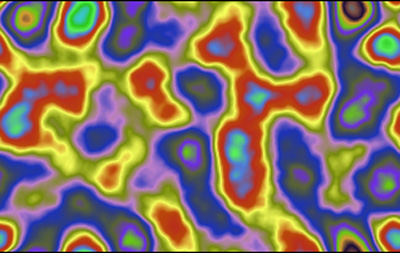
<<<<<=====rs on Quantum Computation: From the perspective of quantum computation as described in Set Lloyd’s “Programming the Universe” it seems easy to have memory and computation all over the place, there are lots of bits to go around. =========>>>>>Rudy on Quantum Computation:
Yes, I recently came to realize that, given quantum computation, a rock really is as rich a system as a fire or a waterfall. At the quantum scale it’s like a sun. Or like a ball and spring model with a trillion chaotic strings. I had some nice email from Seth Lloyd after I reviewed his book on my blog (use the Search window to find it…). He said something along the lines of, “even if you don’t LIKE the idea of a quantum reality, that’s what’s really TRUE.” I’m letting the quantum into my heart.

<<<<<=====rs on Silp Happiness: Consciousness centered in inorganic objects would have different motivations, different mental axes. For instance a rock might not mind if it never moved? Perhaps it’s only humans that are so often unhappy with their situations. Maybe silps don’t even have the unhappy/happy axis. =========>>>>>Rudy on Silp Happiness:
Maybe not, but I think it’s gonna be more fun to pretend that they do. The animist religions always have the spirits being happy or unhappy with what we’re doing.
Thanks for all the feedback, y’all. This is a big help to me.









February 3rd, 2007 at 1:34 pm
hey that was a really nice summary.
that google company you mention, they are very secretive. I prefer not to draw attention when what is said is generic.
anyway, you really should come by for lunch, it will make you want to go back to work:-)
May 19th, 2007 at 10:14 am
Here’s a link to philsopher Jerry Fodor’s review of what seems to be an interesting book on holozoism/panpsychism:
Consciousness and Its Place in Nature: Does Physicalism Entail Panpsychism?
by Galen Strawson and et al.
Thanks to Nick Herbert for reporting this.
July 3rd, 2012 at 12:56 am
Many people who have had transplants particularly those that have received donated hearts have memories of those the bodyparts belonged to, so it is proof that there are more to human beings than modern people can ever comprehend